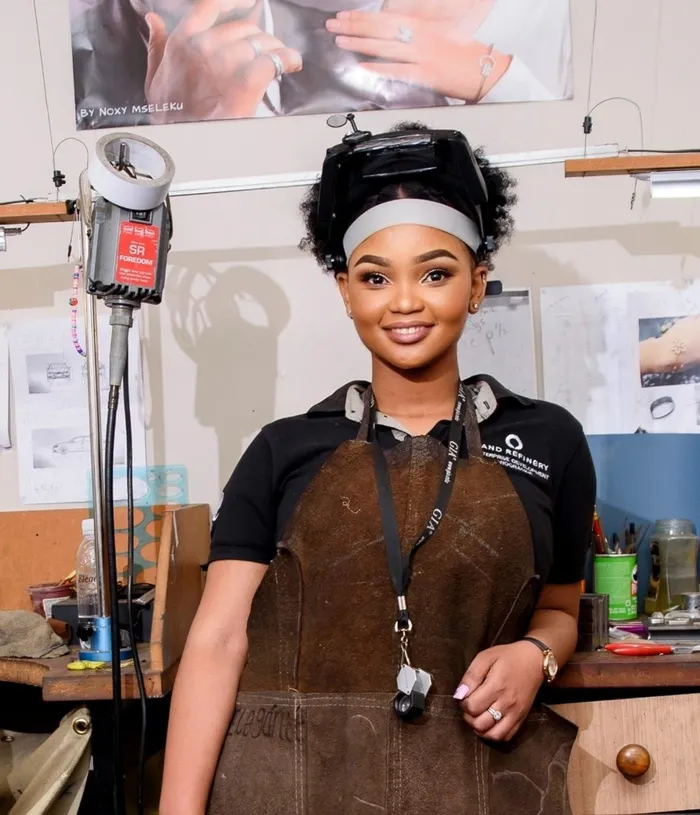
NOXOLO Mseleku in her jewellery workshop.
Image: Supplied.
NOXOLO Mseleku has bedazzled some of the biggest names in South African entertainment.
From Londie London to Abdul Khoza, LaConco, AzureDe and Sbahle Sithole, these are just some of the celebrities who have worn her jewellery.
But the woman from Illovo on the KZN South Coast never imagined her creations would one day bring joy to people both at home and abroad.
“I love working with gemstones wholeheartedly. That's why I went to Belgium to study gemstones and diamond grading. Even our Instagram page is filled with gemstones,” says Mseleku.
She always dreamt of becoming an architect and applied to the University of Johannesburg. But there was no space. After taking a gap year, she applied again, still no luck. Determined not to waste more time, she asked the university what other creative programmes were available.
“So I asked what they have which is design orientated and they told me that they have space in the jewellery department. I got accepted and that's how it all happened.”
Mseleku says maybe she applied too late to get into architecture, but after a difficult start, things took an unexpected turn.
“Jewellery chose me, I didn’t choose it,” she explains.
“Jewellery wasn’t something I wanted at first. It’s very manual, you have to melt metal, roll it, and work with tiny pieces. It’s not just about designing and drawing beautiful things. After all of that, you still have to get hands-on. I found it difficult, especially the precision involved. I actually didn’t like it at first and felt like I was failing at it."
Things changed in her second year when she entered a competition and won.
“I started falling in love with the craft. So, like a spark it just came to me, it just happened.”
Her winning piece represented HIV and AIDS through a dying flower with a healthy infant at its centre, all of it symbolising hope and resilience.
That led to a two-year scholarship in Italy (2015-2017), where she immersed herself in jewellery as an artform. She also completed a diamond grading course in Antwerp, Belgium.
“I'm so glad that when I went to Italy, I found my passion and my love for jewellery. Because in Italy, jewellery is a culture to them, they have different techniques of doing things.”
Mseleku is unapologetic about her love of bling, and yet she wears less jewellery now than before she started her career.
“I am definitely a sucker for romance and beautiful things, but what inspires me most is gemstones,” she adds.
After returning to South Africa, she briefly worked for Browns Jewellers before launching her own brand, Eleganté, inspired by her Italian training and her design ethos of “classical pieces with a twist of modernity.”
She admits it wasn’t easy starting out because the industry is expensive, and making it takes grit. But her perseverance paid off.
“My customers are millennials, young professionals, people that want the finer things in life, because we do your gold and your diamonds.”
Mseleku says that Covid and the economic downturn hit her hard. She closed the retail leg of her business but continued with wholesale manufacturing.
It's a sector, she says, where many talented jewellery designers have exited due to a lack of opportunities. She refused to give up.
Today, Eleganté employs three young skilled professionals who focus on design and manufacturing. Mseleku has stepped back from the bench to focus on sales and marketing, ensuring the business grows while her team concentrates on their craft.
She credits the De Beers Enterprise Programme for making that possible.
The initiative provides mentorship, training and access to resources for entrepreneurs in the jewellery and diamond sector. Mseleku says it helped her sharpen her business model and build a more sustainable enterprise.
However, she remains frustrated by how difficult it is for jewellers in South Africa to access raw materials, despite the country’s mineral wealth.
“That is simply not true when people say we don’t have the talent in this country. We do but there’s so much red tape,” she says. “They send the raw minerals out of the country, and then we have to buy back the finished goods. Meanwhile, we have skilled artisans right here who could create those pieces locally.”
She says the export of raw materials affects her work directly.
“Right now, I need gold for a new collection, but I’m struggling to get it. Instead of allowing us to use what we have, they export the materials before we even get a chance. We should be exporting finished goods, not raw ones.”
According to Mseleku, the challenge is widespread.
“We have a big, big problem with access to materials and it just doesn’t make sense, because they come from here.”
She believes beneficiation programmes like the one from De Beers are starting to make a difference.
“I’m really grateful to be part of that. It’s a step in the right direction.”
Beyond jewellery, Mseleku has taken on high-profile commissions; from crafting awards for the Gauteng Film Commission to creating a 30 Years of Freedom centrepiece for President Cyril Ramaphosa. She was also commissioned to create 800 pendants to raise funds for a hospital in Palestine.
Looking ahead, her dream is to return to retail within five to ten years, open multiple branches, expand her workshop, and create more opportunities for fellow creatives. And she’s definitely happy that there wasn't space to study architecture.